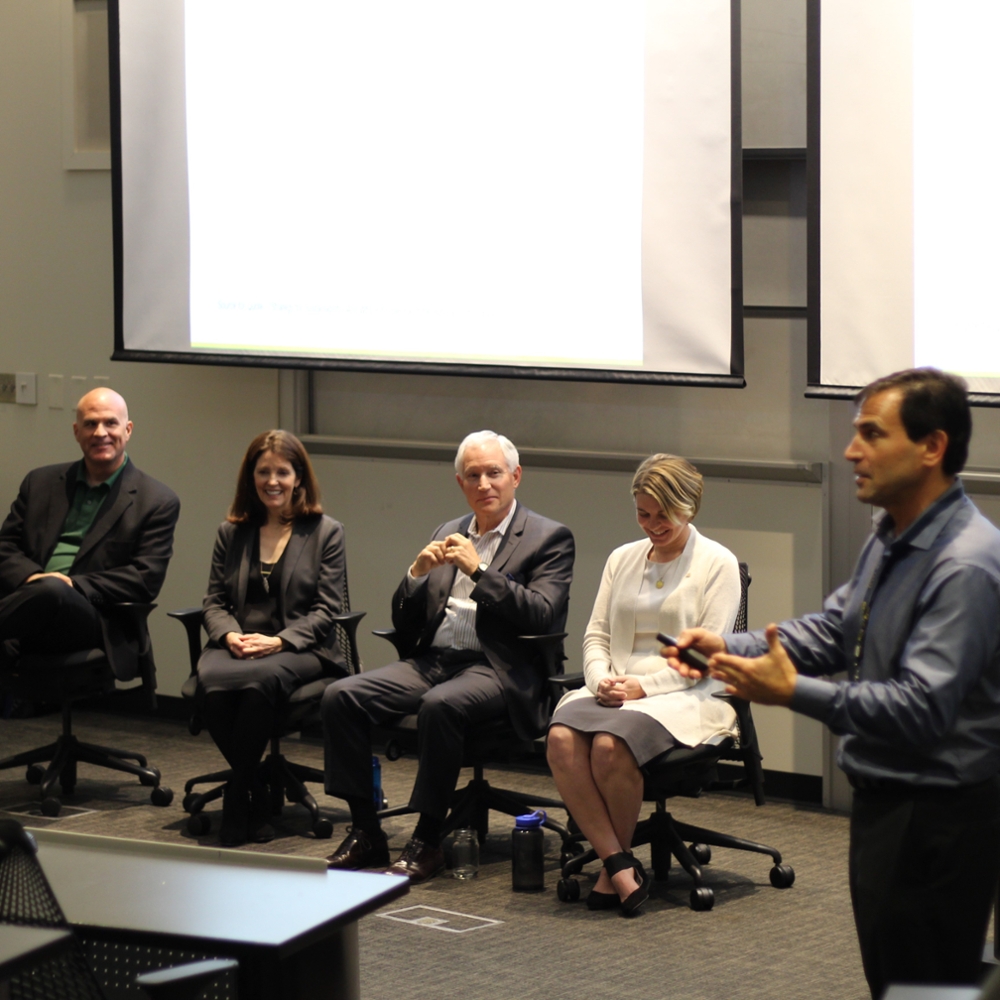On October 25th, the Ray C. Anderson Center for Sustainable Business (“Center”) at Georgia Tech Scheller College of Business and the Scheller MBA Net Impact Chapter co-hosted the fourth annual “Your Business Career and Sustainability” panel. Business leaders from Delta Air Lines, NextEra Energy, SunTrust Bank, and Steelcase Inc. provided guidance for MBA students wishing to contribute to environmental and social goals within the business sector.
In his opening remarks, Michael Oxman, Managing Director of the Center, reminded the audience that while the sustainability movement began with the environment, it has become increasingly complex, including other areas such as social performance (stakeholder engagement, transparency, etc.). Companies increasingly find themselves engaged in a “multi-dimensional system” in which they must measure sustainability’s impact on business success as well as its value to various stakeholders. Oxman said, “Many companies now have a broad framework on sustainability, as they would have on any other business issue. Managed well, sustainability can become part of a company’s competitive advantage.”
As a result of the increasing importance of sustainability, companies need business people who know how to connect business, sustainability, and governance. That being said, Oxman advised students that engaging in corporate sustainability does not require a fully dedicated sustainability job right after graduation. Rather, he said, students can embark on a career trajectory that is enhanced through strong sustainability interest, knowledge, and competencies. Zigzags across various “business lanes”: traditional, sustainability-focused, and hybrid (i.e., traditional but including sustainability-related activities) offer an expanded portfolio of career opportunities that intersect with environmental and social topics. Oxman reminded MBA students, “Be flexible in your careers, and think about how to bring sustainability into any role you may have.”
Using career “lane-changing” as a theme for the evening, moderator Lara Ferreira, Co-President of the Net Impact chapter, asked panelists to describe their journeys toward their current roles. Amy Ross, Vice President of Environmental Risk and Sustainability at SunTrust Bank, described herself as a “recovering real estate developer.” She explained how she worked as an expert advisor for the Department of Urban Housing and Development and the Department of Energy at the intersection of community development and sustainability before assuming her position at SunTrust. Now in a sustainability-focused position, Ross manages environmental risk for the corporate real estate portfolio and creates social impact programming throughout the bank. As the first sustainability manager at SunTrust, she has the unique opportunity to help senior leadership define how sustainability will grow at the company.
A career narrative with even more unexpected twists came from Angela Nahikian, Director of Global Sustainability at Steelcase, the largest office furniture company in the world and one of the first companies to receive LEED certification. Nahikian, who described herself as “an unlikely candidate” for her current role, began her career in electrical engineering and architecture. She rose through various positions within Steelcase, in areas such as lighting design and advanced concepts R&D. When she landed in the advanced concepts group, her work involved identifying emerging trends. In that position, she had an epiphany. She said, “I could see a consistent thread of sustainability running through everything.” Now Nahikian oversees a department of 25 people (in both Grand Rapids and Munich) in a company renowned for its aggressive sustainability goals. She admitted, “I got lucky!”
After sharing career narratives, the speakers addressed what they see as the future of sustainability for their respective companies. Steve Tochilin, General Manager of Environmental Sustainability at Delta, defined communication as key to deepening commitment to sustainable causes. He continuously searches for new ways for Delta to engage stakeholders around sustainability. In that sense, he said, “I’m a cheerleader.” Nahikian, whose job mainly entails corporate strategy around sustainability, focused on the importance of communication with customers, such as listening to their stories in order to discover how Steelcase can meet their needs. Also, she focuses on driving “the next generation of sustainability innovation” in areas such as technical platforms that support green and clean chemistry, shipping and packaging, and the optimization of product performance via life cycle assessment.
Other conversation topics throughout the session included forecasting challenges, the most significant drivers of sustainability, and times when sustainability seemed in conflict with direct goals of one’s company or those of stakeholders. The evening wrapped up with words of wisdom for the MBA students who might find it difficult to wait to land jobs like those of the panelists. Ken Languedoc, Workforce Planning Lead for NextEra Energy, the largest energy generator of wind and solar power in the world, advised students to consider traditional business roles in a sector or business for which sustainability is a core practice. He said, “Whatever role you come into, believe that you are empowered to make recommendations on your first day of work.” Nahikian agreed, telling the students to learn from a mistake she made: underestimating her potential to influence change from Day One. She encouraged students to accept the personal challenge to influence change. She said, “You’ll be surprised what you’re capable of doing.”
Georgia Tech’s Ray C. Anderson Center for Sustainable Business launched in 2013 thanks to the generosity of the Ray C. Anderson Foundation and the Kendeda Fund. The Center was created as a catalyst, connector, and enabler, bringing together students, research faculty, companies, entrepreneurs, and other organizations in environments where business-driven solutions can take shape and thrive.
